14 Books on Authoritarian Rule
The study of authoritarianism has gained momentum over the last twenty years after lying fallow for decades. The interest in autocracy has exploded in part because signs of democratic decay have crept closer to home. Since 2020, a treasure trove of books has assessed the causes and consequences of democratic backsliding, exploring how autocratic elites gain and maintain power. A central question of this new work is identifying the conditions under which democracies collapse into outright authoritarian rule.
This review covers fourteen books written since 2020 that offer the most interesting, compelling, and important analyses. There are common themes across them in how autocrats come to power—the critical role of polarization, for example, and the surprising role of popular support for dictators. Many of the authors provide their take on the authoritarian playbook: the factors—from violence and propaganda, to attacks on media and the judiciary—that sustain authoritarian rule. Yet each author also focuses on different dimensions of the problem. More hopefully, a new strand of writing considers democratic resilience: the conditions under which threats to democracy might be contained or reversed.
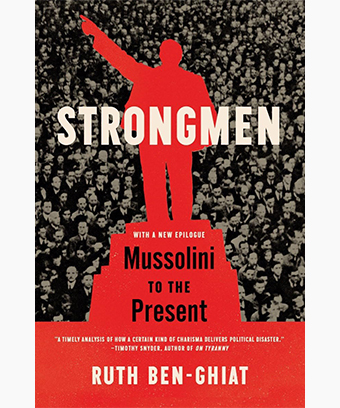
Strongmen: Mussolini to the Present (Ruth Ben-Giat. Norton, 2020)
Authoritarianism is hardly new, and several historians have offered broad overviews. Ben-Ghiat is an historian who has written extensively on Italy. In contrast to the political scientists on this list, she does not come with a theoretical ax to grind. She surveys the long arc of strongmen, from the interwar period through the surge of military coups in the early postwar period to the current return of authoritarian rule, and outlines components of the autocrat’s toolkit. Current strongmen, she writes, have drawn heavily on their national predecessors: Putin on Stalin, Berlusconi on Mussolini. She also has interesting things to say about the sexual politics of strongman rule with its emphasis on virility and male dominance and devotes a chapter to the recurrent project of “national greatness.”

The Wannabe Fascists: A Guide to Understanding the Greatest Threat to Democracy (Federico Finchelstein. University of California Press, 2024)
Fascism is a loaded epithet that is bandied around way too loosely. Yet it is a real historical tradition. Finchelstein comes at the problem from the perspective of a sociologist as well as historian and with personal experience of the phenomenon as it played out in Argentina. Many studies of autocracy kick off with the concept of populism, which used to be defined as a form of leftist redistributive politics. But the term is now more commonly viewed as a political appeal that is personalist, majoritarian, appeals to the “true” people or nation, and often comes from the right rather than the left of the political spectrum. Finchelstein argues that populist leaders can be pragmatic and not necessarily a threat to democratic rule. But some populists are “wannabe fascists” and end up veering into dark political waters.
Finchelstein is similar to Ben-Ghiat in providing a fascist “playbook,” which includes propaganda and xenophobia, and the targeting of minorities and immigrants in particular. But he leads with the central role of violence in fascist thought and practice—not as something to be tamed but as a source of political power and even emancipatory promise. Most frightening is the way fascists not only use the coercive power of the state, but can rile up social violence from below. To say that such strategies are inimical to democratic rule hardly bears stating.
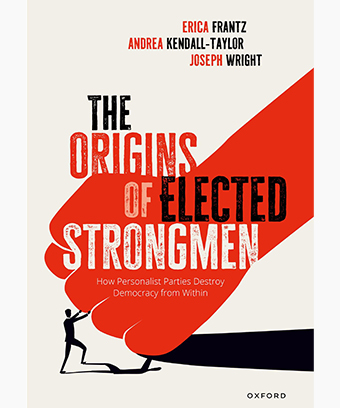
The Origins of Elected Strongmen: How Personalist Parties Destroy Democracy from Within (Erika Frantz, Andrea Kendall-Taylor and Joe Wright. Oxford University Press, 2024)
How do autocratic rulers come to power in the first place? This team places particular emphasis on the rise of personalist leaders and their parties. Historically, political parties in democratic systems emerged to contest policy platforms and had an institutional life separate from their leaders. Personalist parties, by contrast, are instruments of the leader and typically stacked with loyalists. The authors’ data-rich treatment of the topic surveys the rise of personalist political parties worldwide and how they contribute to democracy’s decline by eroding horizontal checks on executives, such as courts or anti-corruption bodies. They argue that two main factors have driven the rise of personalist parties: the way mass media allows for direct connections between leaders and publics that circumvent party linkages, and partisan dealignment—the gradual erosion of partisan identities and the corresponding quest for men on white horses.
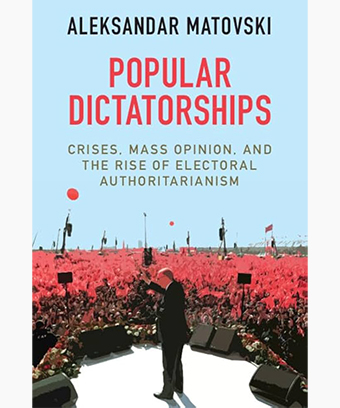
Popular Dictatorships: Crises, Mass Opinion, and the Rise of Electoral Authoritarianism (Aleksandar Matovski. Cambridge University Press, 2021)
One of the biggest puzzles of the new authoritarianism is that it is genuinely popular. This popularity, Matovski argues, stems from crisis and from public yearning for “strong” leadership that can solve problems fast. Matovski details the popular authoritarian playbook and the focus on delivering countries from crises—economic crises, pandemics, wars—and backs it with statistical evidence of the crisis-authoritarian breakdown relationship. One distinctive feature of Matovski’s work is his attention to public opinion. A close observer of Russia, he does a deep dive into polling in the country and shows how liberals were adrift after economic reforms failed to deliver; they were no match for Putin’s promises of great power revival.
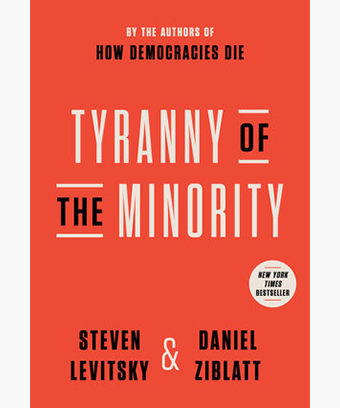
Tyranny of the Minority (Steven Levitsky and Daniel Ziblatt. Crown, 2023)
Levitsy and Ziblatt are Harvard political scientists who broke out with their 2018 bestseller How Democracies Die. Their knowledge about democratic developments in the world is encyclopedic, drawing on cases as diverse as the first partisan turnover in an American election in 1801, to France in the 1930s and America today. They start with the simple observation that allowing democratic turnover—incumbents giving up power when they lose—is easier if you think you can return to office and that the consequences of elections are not existential. As a result, they believe that norms are quite consequential. Democracy depends on restraint and erodes when the limits of political power are pushed to the breaking point by “constitutional hardball”: the exercise of formally legal powers that nonetheless tilt the political playing field. Several features of the book make it unique, including attention to how proto-democracy broke down in the American South after Reconstruction and their contention that the United States did not really get back to democratic principles until the voting rights legislation of the mid-1960s.
They do not pull punches about the current era. They argue that portions of the Republican Party have effectively abandoned democratic norms, visible first in their efforts to suppress voting rights by challenging ID requirements. The title of their book comes from the observation that features of the Constitution—most notably the Senate and the Electoral College—embed serious disproportionality in the political system: that majorities do not necessarily hold power. This disability is compounded by ongoing efforts to limit the franchise at the state level, resulting in large gaps between what Americans want and what the political system delivers. (This point is articulated well in an IGCC Talking Policy podcast with Marty Gilens here.)

Backsliding: Democratic Regress in the Contemporary World (Stephan Haggard and Robert Kaufman. Cambridge University Press, 2021)
We were not the first to identify the backsliding phenomenon but tried to codify some of its causes. Our book is built around 16 case studies of democratic backsliding, and includes countries where democracy has largely survived (the United States, Brazil) and others where initial departures from democratic rule metastasized over time (Russia, Turkey, Venezuela). We argue that polarization appears as a near necessary condition for backsliding but that legislatures play an important role—either as a check on unbridled power or as an emblem of the steamrolling of checks and balances. We also find that the checks on the executive are usually undermined incrementally—one small step at a time. Indeed, incrementalism might itself be a cause of democratic decay, as publics and oppositional elites are disoriented by anti-democratic changes that then are normalized.

The Future of Free Speech (Leo Bollinger and Geoffrey Stone, eds. Daedalus, Journal of the American Academy of Arts and Sciences Summer 2024)
In this collection, a group of constitutional scholars, consider what limits—if any—should be placed on free speech. Why include such a collection in a discussion of autocratic rule? As J.D. Vance’s Munich speech demonstrated, the right has its own story about democratic backsliding that centers on efforts to control free speech, with Europe being the poster child. Whether democracies have an obligation to protect the political rights—and speech—of those committed to overthrowing democratic rule is not a simple nut to crack and Europeans have different answers to that question than Americans. The collection also grapples with the problems posed by mis- and dis-information, including that emanating from autocratic adversaries.
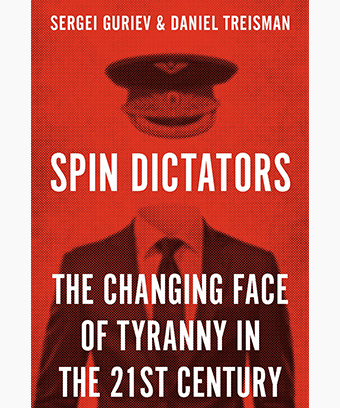
Spin Dictators: The Changing Face of Tyranny in the 21st Century (Sergei Guriev and Daniel Treisman. Princeton University Press, 2022)
While some authors in this genre view autocracy as an enduring political form, others underline distinctive features of its current incarnation. Guriev and Treisman argue that a new form of autocracy has emerged in the 21st century. Rather than relying on repression and ultimately fear, “spin dictators” maintain power by manipulating information. They are popular, pretend to be democratic, and are surprisingly open to the world, in contrast to the closed Stalinist systems of the 20th century. More controversial is the claim that spin dictators avoid extreme repression. Guriev and Treisman argue that Singapore’s Lee Kuan Yew was a progenitor of this political form, but they are both close observers of the Russian system as well. Given where that regime has gone, I don’t know if they would still hold to the “limited repression” generalization. But they provide a strong introduction to what they call postmodern propaganda and how the new social media landscape can end up sustaining authoritarian rule.
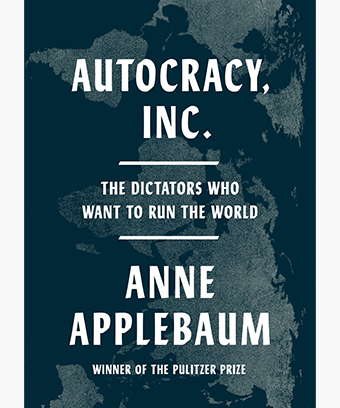
Autocracy Inc.: The Dictators Who Want to Change the World (Anne Applebaum. Doubleday, 2024)
Anne Applebaum, a longtime journalist and current staff writer at The Atlantic, is one of the most visible public intellectuals writing today on democracy and dictatorship. In her book, she focuses on cooperation among autocratic regimes, including on the economic front (which is also something we cover at IGCC through our project on Illiberal Regimes and Global Governance). Applebaum points out that many if not most authoritarian regimes also have a distinct political economy and operate like mafia states, extorting resources and thriving off corruption. One of her conclusions is that democracies need to do more to track the flow of funds, and to curb economic cooperation among autocracies, including the scandal of the offshore financial centers that shelter corrupt dictators’ cash. (A more complete review can be found here.)

A World After Liberalism: Five Thinkers Who Inspired the Radical Right (Matthew Rose. Yale University Press, 2021)
One consequence of the revived interest in authoritarianism is renewed attention to the illiberal far right. These thinkers typically do not make it onto college syllabi, but have fostered loyal undergrounds of readers and new transnational networks and movements. Matthew Rose, director of the Barry Center on the University and Intellectual Life, provides short, punchy treatments of five of these figures, each with somewhat different disaffections with liberalism: Oswald Spengler, who is focused on the decline of the West; Julius Evola, an Italian fascist who has had a surprising revival; the American Francis Parker Yockey, who spent his life in the U.S. fascist underground; Alain de Benoist, an influential French theorist of right-wing identity politics; and Samuel Francis, who outlined a kind of right-wing Marxism aimed at underclass American voters. An interesting finding of stacking these highly diverse and quirky thinkers together is that all were deeply skeptical of Christianity, seeing it as a progenitor of universal values and a kind of moral leveling that is antithetical to their elitist politics. Illiberal political thought deserves way more attention than it receives: we have repeatedly seen such ideas drift from the political fringe into the mainstream.

America Last: The Right’s Century-Long Romance with Foreign Dictators (Jacob Heilbrunn. Liveright, 2024)
The title of Heilbrunn’s book pretty much summarizes his entertaining history of those portions of the American right who embraced dictators. Of course, the left has its gullible Stalinists as well, but the right’s fascination with political figures like Orbán and Putin has different roots. Heilbrunn’s explanation for the right’s fascination with strongmen does not lie in grand strategy but in temperament: that the admirers of foreign dictators don’t have much love for democracy to begin with. The editor of the National Interest, Heilbrunn uncovers a rogue’s gallery reaching back in time to public intellectuals like Henry Louis Mencken and George Sylvester Viereck, who admired the Kaiser both before and after U.S. entry into World War I. The cast of characters also includes American fascists and Nazi sympathizers, including Charles Lindbergh, and Cold War intellectuals like William Buckley and Jeanne Kirkpatrick. Heilbrunn also highlights the important ideological role played by Patrick Buchanan and the revival of these ideas by Tucker Carlson.
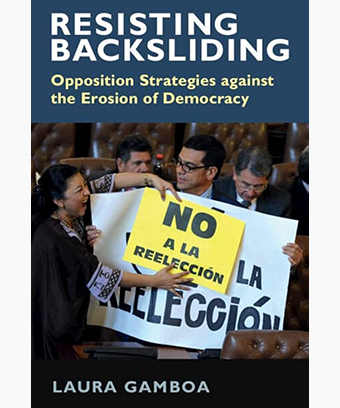
Resisting Backsliding: Opposition Strategies Against the Erosion of Democracy (Laura Gamboa. Cambridge University Press, 2022)
Is there a way out of autocratic rule? Gamboa deserves credit for helping to shift the conversation from backsliding to how to check it. A Latin Americanist, Gamboa anchors her study in a comparison of Colombia and Venezuela—one country where democracy was fragile but sustained, the other in which it has completely collapsed. But the findings are far more wide-ranging. She argues that in Colombia, oppositions hewed closely to constitutional processes and played an insiders’ game: forging coalitions in the legislature and using the courts while maintaining a moderate posture. In Venezuela by contrast she argues that boycotts, strikes and even a coup against Chávez only served to more deeply entrench incumbents.

Democracy’s Resilience to Populism's Threat: Countering Global Alarmism (Kurt Weyland. Cambridge University Press, 2024)
Weyland is a prominent Latin Americanist and anchors his study in the long tradition of Latin American populism. Like Frantz et. al., Weyland views populism, not as an economic ideology, but as a personalist style of autocratic rule. His take, however, is more upbeat. Surveying an array of governments over the postwar period, he focuses on institutional conditions that can encourage populism. In Europe, for instance, parliamentary government can provide an opening for right (and sometimes left) populist parties. In Latin America, presidentialism is actually a bulwark against populist excesses except when shocks generate dramatic turnovers of government. Weyland believes that populists frequently miscalculate their appeal and that political institutions can provide counterweights, for example, in the refusal to form governments with far-right parties in Europe or legislative checks on presidential systems in Latin America. Weyland is too optimistic for my taste, but an advantage of the book is its detailed case studies of populist failure, for example in the ouster of Bolsonaro in Brazil.
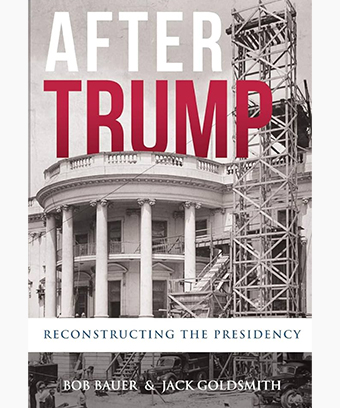
After Trump: Reconstructing the Presidency (Bob Bauer and Jack Goldsmith. Lawfare Institute, 2020)
In a strict sense, this is not a book about authoritarian rule. But it is a fine-grained consideration of the powers of the American presidency and how the office might be reformed to limit executive overreach. Prominent legal scholars Bauer and Goldsmith get deep into the weeds of the particular features of the American presidency—many anchored in Article II of the Constitution—and show how expansive definitions of presidential powers can prove weak points with respect to democratic rule. They walk through presidential ethics obligations (and their limits), the pardon power, presidential tussles with the press, the fraught relationship between the executive and the Department of Justice, including special counsels, and relations with Congress. The legal theory of the unitary executive that conservative legal scholars are advancing—which calls for a dramatic increase in presidential authority—is about to be tested in the courts. Written in the wake of the first Trump presidency, Bauer and Goldsmith are much more inclined to see risks than benefits in concentrated executive power.

Global Policy At A Glance
Global Policy At A Glance is IGCC’s blog, which brings research from our network of scholars to engaged audiences outside of academia.
Read More